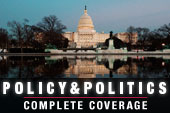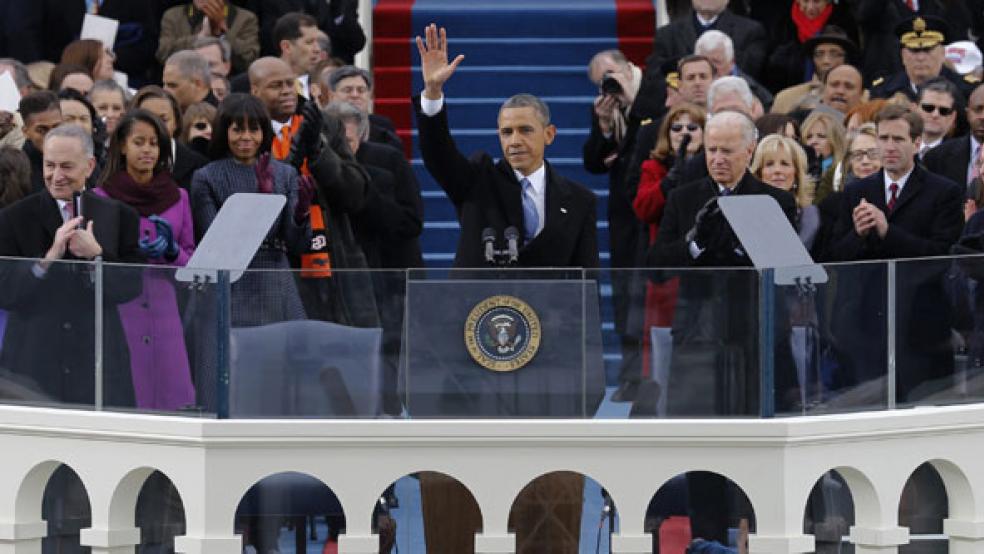In his first inaugural address in 2009, President Obama said he would help end “the petty grievances and false promises, the recriminations and worn-out dogmas, that for far too long have strangled our politics.”
What a difference four bruising years can make.

When he first took office, Obama’s ambitions rested on the promise that the turmoil of recent years – the economic crisis, the wars in Afghanistan and Iraq – would be drowned out by the optimism embodied by the election of the first African-American president in U.S. history. “What the cynics fail to understand is that the ground has shifted beneath them, that the stale political arguments that have consumed us for so long, no longer apply,” Obama said four years ago.
But on Monday, a battle-tested and noticeably grayer president delivered a second inaugural address that suggested those stale arguments never disappeared. His homily this time was a history lesson, remarkable because it applied 18th century principles to the decidedly modern causes of gay rights and climate change. He chose not to speak about the specific accomplishments of his own presidency – health care reform, Wall Street reform – and instead dwelled on the work of previous generations.
The message marked the difference between an Obama who was swept into office four years ago with a Democratic Congress squarely behind him, and an Obama who has confronted a Republican majority in the House for the past two years. Many GOP lawmakers see the recent gridlock between the executive and legislative branches as being true to the Constitution, while Obama sees the stalemate as more and more destructive.
“Progress does not compel us to settle centuries-long debates about the role of government for all time, but it does require us to act in our time,” Obama said Monday.
The president acknowledged that there must be room for give-and-take in partisan debates. Throughout history, Obama said, “we have never relinquished our skepticism of central authority, nor have we succumbed to the fiction that all society’s ills can be cured by government alone.” But he added that Americans have always understood that “when times change, so must we; that fidelity to our founding principles requires new responses to new challenges; that preserving our individual freedoms ultimately requires collective action.”
SECOND-TERM REALITIES
His tempered remarks showed a chief executive who increasingly understands the limitations of office – especially in a second term. For the hundreds of thousands of people who gathered on the Mall and the millions more who were watching on television, the speech was oddly devoid of any applause lines tied to his first term. There were just 12 words total about his stewardship of the economy during the Great Recession and his role in ending the war in Iraq and the upcoming withdrawal of combat troops from Afghanistan. There was literally no mention of his likely legacy, the 2009 passage of a controversial health care reform law.
As for his legislative and political agenda for the next four years, the president spoke in broad shorthand about a legislative “ journey” to assure economic equality for women, expanded rights for gay men and women, elimination of impediments to voting, and immigration reform-- including a path to citizenship for millions of illegal immigrants.
“Our journey is not complete until we find a better way to welcome the striving, hopeful immigrants who still see America as a land of opportunity, until bright young students and engineers are enlisted in our workforce rather than expelled from our country,” he said.
A scorecard on the 44th president’s second inaugural address might look like this:
- Newsmaking – Almost out of the blue, Obama revived the climate change issue, promising to press for ways to reduce industrial greenhouse gas emissions after shelving the issue for years.
- Tone – Obama was less idealistic than in the past about what he can do as president, but more realistic about what needs to be done in the next four years and beyond.
- Message to Republicans – Extremism in the defense of life and liberty is no virtue. “Being true to our founding documents does not require us to agree on every contour of life; it does not mean we will all define liberty in exactly the same way, or follow the same precise path to happiness,” he said.
- Memorable Lines – “Through blood drawn by lash and blood drawn by sword, we learned that no union founded on the principles of liberty and equality could survive half-slave and half-free”; and “the American people can no more meet the demands of today’s world by acting alone than American soldiers could have met the forces of fascism or communism with muskets and militias”; and “We must make the hard choices to reduce the cost of health care and the size of our deficit, but we reject the belief that America must choose between caring for the generation that built this country and investing in the generation that will build its future.”
The relatively brief speech was surprisingly subtle. Obama referenced the “quiet lanes” of Newtown, Conn., but not the far-ranging gun control initiatives he announced after the mass killing at Sandy Hook Elementary School there. He talked about the importance of being “together” – but not how that togetherness depended on government investments in schools and roads.
EARTHLY RESPONSIBILITIES
His one unapologetic call to action was for addressing climate change, an issue that has sat on the backburner for the past several years.
Two years after taking office in 2009, Obama abandoned his drive for passage of a European-style “cap and trade” solution to contain industrial green-house gas emissions in the face of unflinching opposition from industry and Republican lawmakers. The market-based approach in effect places a price tag on pollution and creates incentives for companies that cut back on their emissions – and penalties for those that don’t. But yesterday, the president declared, “We will respond to the threat of climate change, knowing that the failure to do so would betray our children and future generations.”
The president defended his announcement by saying the debate about the science of climate change was irrelevant, given the tide of natural disasters in recent years, most recently Hurricane Sandy. “Some may still deny the overwhelming judgment of science, but none can avoid the devastating impact of raging fires, and crippling drought, and more powerful storms,” he said.
For all his bitter fighting with House Republican leaders over heath care reform, spending, taxes and the debt ceiling over the past two years, Obama struck a conciliatory tone in his speech. He acknowledged the need to contain medical spending in order to reduce the budget deficit, yet warned that the perfect solution – impossible for Democrats or Republicans to achieve – was the enemy of the greater good.
“For now decisions are upon us, and we cannot afford delay,” he said. “We cannot mistake absolutism for principle, or substitute spectacle for politics, or treat name-calling as reasoned debate,” he said. “We must act, knowing that our work will be imperfect.”





